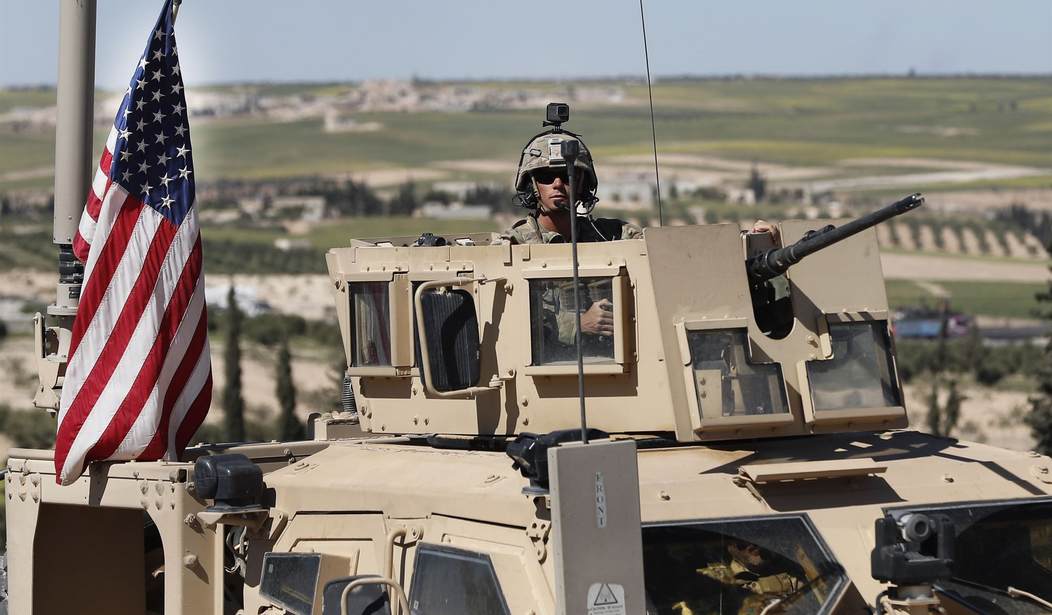President Trump’s decision to withdraw troops from Syria last month kicked up a hornet’s nest, resulting in bitter backlash from members of both parties in Congress, the media, and the American public.
The president’s decision was quickly cast as a simplistic, binary decision – in which the removal of American troops all but guaranteed genocide for the abandoned Kurds who have fought valiantly in the battle against ISIS. But the true geopolitical situation is much more nuanced. Protecting Kurdish lives and preserving American troops and assets are not mutually exclusive.
It is important to remember the initial motivation for the White House’s decision was not to abandon the Syrian Kurds, but to protect American troops. The president’s initial decision to remove “all of about 1,000 U.S. troops” was, as The Washington Post reported, a reaction to a Turkish invasion that cut U.S. supply lines and “[endangered] American forces.”
The U.S. is spending $1.25 trillion annually on war. Since 2001, over 6,000 Americans have been killed in Middle East war zones, and more than 53,700 U.S. soldiers and sailors have been officially listed as wounded. The president’s argument is valid that “when we commit American troops to battle, we must do so only when a vital national interest is at stake – and when we have a clear objective, a plan for victory, and a path out of conflict.”
We cannot, however, ignore our duty to honor the years of allied fighting and lives lost by Kurdish Syrians. With over 30 million Kurds spread across Turkey, Syria, Iraq, and Iran, the Kurds make up the fourth-largest ethnic group in the Middle East, following Arabs, Persians, and Turks. Because they have never obtained a permanent nation-state, they have remained a target of violence and persecution in the region for decades. In the eight years since the commencement of the Syrian civil war, over 11,000 Kurds have died fighting ISIS.
Recommended
But America should not support the Kurdish people merely out of military propriety. The Kurds also share commonality with many Americans. They are one of the most religiously tolerant groups in the Middle East, with over 40,000 Christians living near the Syrian-Turkey border. Additionally, a small percentage of Kurds are Jewish, and the Kurds, regardless of their religious affiliations, have long supported Israel and the Jewish people.
While many pundits are condemning the White House, it is becoming more apparent that we can still support the Kurdish people in Syria without remaining in perpetual war in the Middle East. The president’s plan is a multi-phased one, and it is much more complicated than just “leaving Kurdish allies to die.”
For example, the administration convinced Turkey to agree to a permanent ceasefire in Syria that will help secure a more peaceful and stable border. The president lifted sanctions on Turkey, but has said “should Turkey fail to honor its obligations, including the protection of religious and ethnic minorities – … – we reserve the right to re-impose crippling sanctions.” And while the preservation of Syria’s oil reserves also has been criticized, it actually is a strategic move to prevent the oil fields from falling into ISIS’s hands.
Further, to demonstrate the Trump administration’s commitment to eradicating ISIS, just days ago U.S. Delta Forces finalized a months-long operation that ultimately led to the elimination of Abu Bakr al-Baghdadi, the leader of ISIS, who died in an assault on his compound in northwestern Syria. This successful raid largely was reliant on intelligence provided by a Kurdish informant embedded deep within al-Baghdadi's inner circle. The Kurdish informant reportedly tracked down al-Baghdadi for five months and provided a floor plan of one of his hideouts, including the number of guards and locations of tunnels. Then the day after the al-Baghdadi raid, a CIA drone strike killed the chief spokesman for ISIS, who had been considered a potential successor to al-Baghdadi.
The ongoing conflict in Syria since the Arab Spring has led to the death of over 250,000 people and displaced millions. We need to find a middle ground between protecting Kurdish lives and not placing American service members in perpetual risk in a region that has been plagued with violence for hundreds of years. As we are seeing unfold, a multi-phased, step-by-step approach to further weaken ISIS by precision strikes on high level assets, to protect oil reserves whose proceeds can be used to support the Kurds, and a renewed emphasis on keeping Turkey at bay from further encroachment into Syria via a new Northern Syria Buffer Zone all taken together can ultimately provide more stability while incrementally drawing down American troops.
Timothy Head is the Executive Director of the Faith & Freedom Coalition.

























Join the conversation as a VIP Member